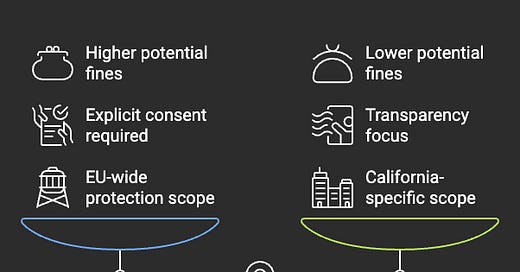GDPR & CCPA: What Every Business Needs to Know
Understanding the Key Differences and How to Stay Compliant
In today’s digital age, data privacy laws like the General Data Protection Regulation (GDPR) and the California Consumer Privacy Act (CCPA) are no longer optional for businesses operating online. Both aim to protect consumer data, but their approaches and requirements are different. Here’s a breakdown of what they mean, how they affect your company, and why compliance is critical.
What Is GDPR?
The GDPR, introduced in 2018, is a European Union (EU) regulation designed to give individuals more control over their personal data. It applies to any business that processes the data of EU citizens, regardless of where the business is based.
Key principles of GDPR include:
1. Consent: Businesses must obtain clear and explicit consent before collecting or using personal data.
2. Transparency: Users must know what data is being collected and how it will be used.
3. Data Access & Deletion: Individuals can request access to their data or ask for it to be deleted (“the right to be forgotten”).
Example of GDPR Violation:
• In 2019, Google was fined €50 million by French regulators for failing to provide satisfactory information about how user data was processed and for not obtaining valid consent for personalized ads.
What Is CCPA?
The CCPA, enacted in California in 2020, focuses on data transparency and consumer rights. It gives California residents the right to:
1. Know: What personal data is collected, how it’s used, and with whom it’s shared.
2. Opt-Out: Prevent businesses from selling their personal data.
3. Delete: Request the deletion of their data.
Unlike GDPR, which emphasizes consent, the CCPA is more about disclosure and providing consumers with control over their data.
Example of CCPA Violation:
• Sephora was fined $1.2 million in 2022 for failing to inform users that their data was being sold to third parties and for not honoring opt-out requests.
Key Differences Between GDPR and CCPA
How to Stay Compliant
1. For GDPR:
• Include a cookie consent banner on your website.
• Have a clear privacy policy explaining how user data is processed.
• Provide mechanisms for users to access, delete, or modify their data.
2. For CCPA:
• Update your privacy policy to disclose all data collection practices.
• Add a “Do Not Sell My Personal Information” link on your website.
• Train employees to handle data requests from California residents.
Why Compliance Matters
Non-compliance can lead to hefty fines and damage to your reputation. For instance:
• GDPR Fines: British Airways was fined €22 million in 2020 for a data breach exposing personal details of over 400,000 customers.
• CCPA Fines: Retail giant Walmart faced lawsuits for failing to comply with CCPA’s opt-out requirements.
Beyond avoiding fines, compliance builds trust with your customers, giving them confidence in how their data is handled.
Final Thoughts
While GDPR and CCPA may seem complex, they boil down to respecting consumer data and prioritizing transparency. By taking the right steps, businesses can stay compliant and foster trust with their audiences.
If you’re still unsure where to start, consult a legal expert or explore tools that help automate compliance processes. Staying ahead of privacy laws isn’t just a legal obligation—it’s a responsible business move.


